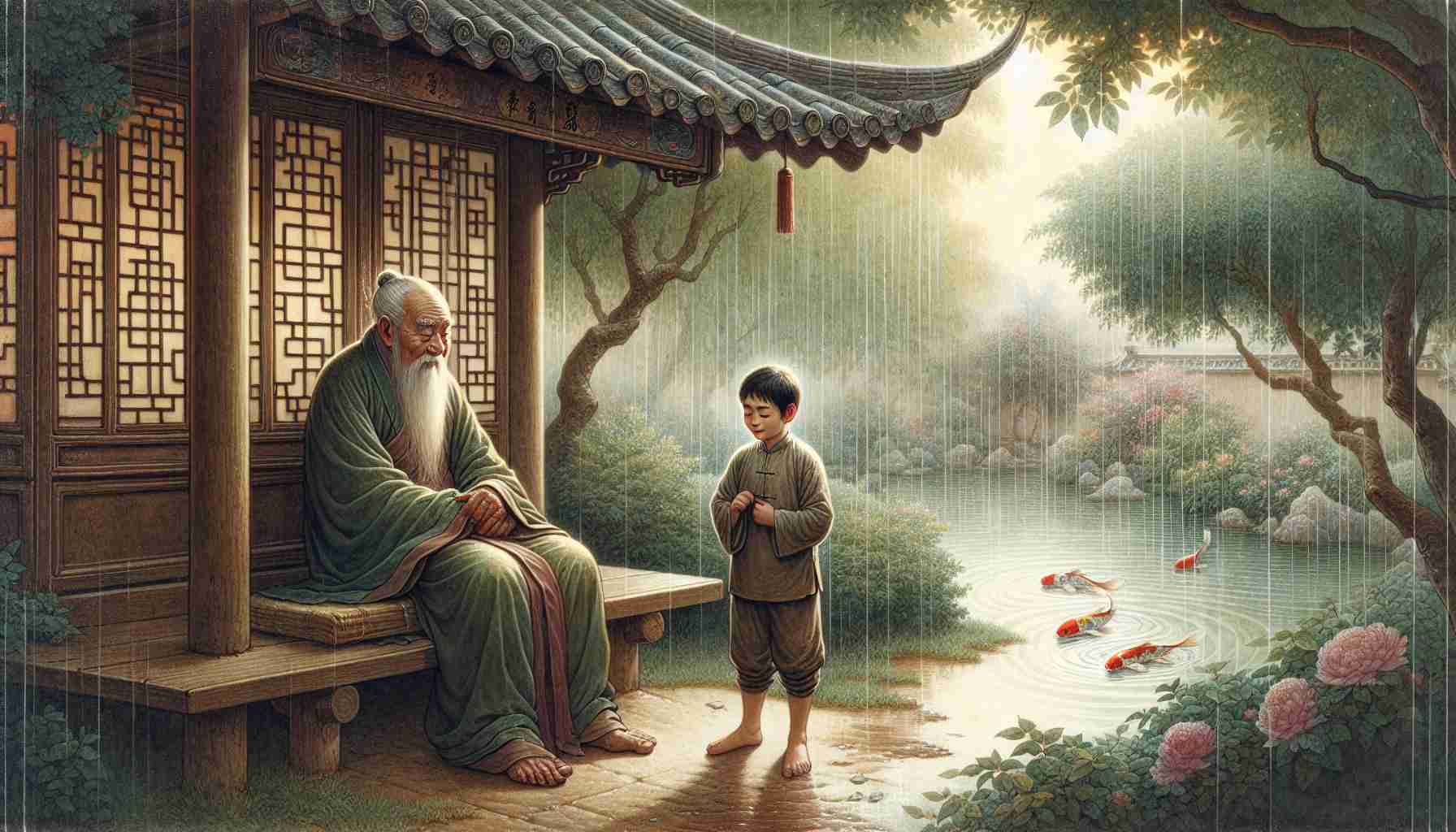

The rain had been falling all morning, soft and steady, turning the garden path into a river of mud. I sat on the porch, my chin in my hands, watching the water drip from the roof.
“I had big plans today,” I sighed. “Now everything’s ruined.”
My grandfather, who everyone in our village called Lao Po—meaning “Old Grandpa”—sat quietly beside me. He sipped his tea, steam rising around his wrinkled face. He didn’t seem upset at all.
“The rain doesn’t ruin things,” he finally said. “It just reminds us to pause.”
“But I had drawn up maps, packed snacks, even sharpened my walking stick. I was going to climb the big hill and find the old stone tree!” I said, stomping once for every problem.
Lao Po chuckled softly. “Ah, the stone tree. So eager to chase after things.” He tapped his walking stick on the floor. “Sometimes, the best path is the one we don’t take.”
I didn’t understand. “That doesn’t make any sense,” I muttered. “Sometimes you have to do things. Sitting here won’t get me anywhere.”
He didn’t answer. Instead, he closed his eyes and listened to the rain. Just when I was about to groan in frustration, he stood up and said, “Come.”
I followed him barefoot into the garden. The rain felt cold and clean as it hit my skin. Lao Po walked slowly, every step soft and balanced, as if the wind itself was helping him move.
“Long ago,” he said, “there was a farmer whose only horse ran away. His neighbors said this was terrible. But the farmer only said, ‘Maybe.’ That same horse returned, bringing wild horses with it. The neighbors cheered, but he said, ‘Maybe.’ Then, his son broke his leg while riding one. Again, ‘Maybe.’ Later, soldiers came to take young men for war, but the boy was left behind because of his leg. The farmer only ever said…”
“‘Maybe’,” I whispered.
“Yes,” Lao Po nodded. “He didn’t chase good or bad. He stayed in balance.”
We reached the koi pond. The fish drifted lazily, not worried about the rain or sun.
“Even though the day didn’t go as you planned, you still learned something,” Lao Po said. “What do you think the Tao teaches us today?”
I looked at the fish, the leaves bent under the raindrops, the quiet ripples in the pond. I took a breath and said, “Not every change is bad. Maybe I don’t have to fix everything all the time.”
He smiled. “That is Wu Wei—non-action. Doing without doing. Letting things be.”
As we walked back to the porch, I felt lighter. I hadn’t climbed a hill or found a tree made of stone. But I had discovered something else—how to find stillness in the rain.
I didn’t change overnight. But now, whenever things don’t go my way, I remember the koi. I try not to fight the flow. I let it rain.
The rain had been falling all morning, soft and steady, turning the garden path into a river of mud. I sat on the porch, my chin in my hands, watching the water drip from the roof.
“I had big plans today,” I sighed. “Now everything’s ruined.”
My grandfather, who everyone in our village called Lao Po—meaning “Old Grandpa”—sat quietly beside me. He sipped his tea, steam rising around his wrinkled face. He didn’t seem upset at all.
“The rain doesn’t ruin things,” he finally said. “It just reminds us to pause.”
“But I had drawn up maps, packed snacks, even sharpened my walking stick. I was going to climb the big hill and find the old stone tree!” I said, stomping once for every problem.
Lao Po chuckled softly. “Ah, the stone tree. So eager to chase after things.” He tapped his walking stick on the floor. “Sometimes, the best path is the one we don’t take.”
I didn’t understand. “That doesn’t make any sense,” I muttered. “Sometimes you have to do things. Sitting here won’t get me anywhere.”
He didn’t answer. Instead, he closed his eyes and listened to the rain. Just when I was about to groan in frustration, he stood up and said, “Come.”
I followed him barefoot into the garden. The rain felt cold and clean as it hit my skin. Lao Po walked slowly, every step soft and balanced, as if the wind itself was helping him move.
“Long ago,” he said, “there was a farmer whose only horse ran away. His neighbors said this was terrible. But the farmer only said, ‘Maybe.’ That same horse returned, bringing wild horses with it. The neighbors cheered, but he said, ‘Maybe.’ Then, his son broke his leg while riding one. Again, ‘Maybe.’ Later, soldiers came to take young men for war, but the boy was left behind because of his leg. The farmer only ever said…”
“‘Maybe’,” I whispered.
“Yes,” Lao Po nodded. “He didn’t chase good or bad. He stayed in balance.”
We reached the koi pond. The fish drifted lazily, not worried about the rain or sun.
“Even though the day didn’t go as you planned, you still learned something,” Lao Po said. “What do you think the Tao teaches us today?”
I looked at the fish, the leaves bent under the raindrops, the quiet ripples in the pond. I took a breath and said, “Not every change is bad. Maybe I don’t have to fix everything all the time.”
He smiled. “That is Wu Wei—non-action. Doing without doing. Letting things be.”
As we walked back to the porch, I felt lighter. I hadn’t climbed a hill or found a tree made of stone. But I had discovered something else—how to find stillness in the rain.
I didn’t change overnight. But now, whenever things don’t go my way, I remember the koi. I try not to fight the flow. I let it rain.